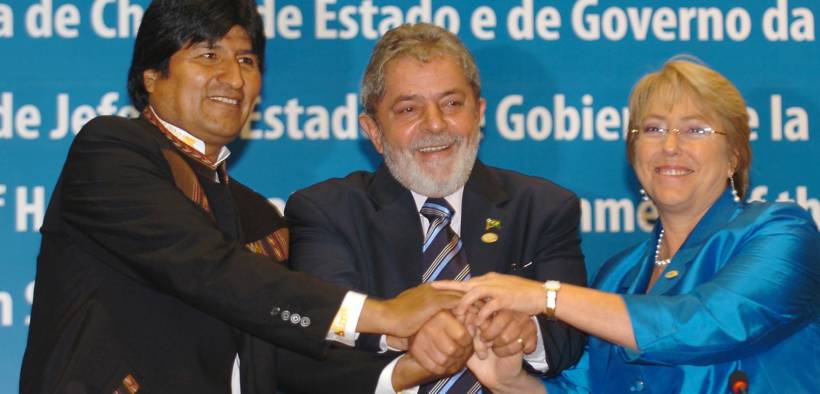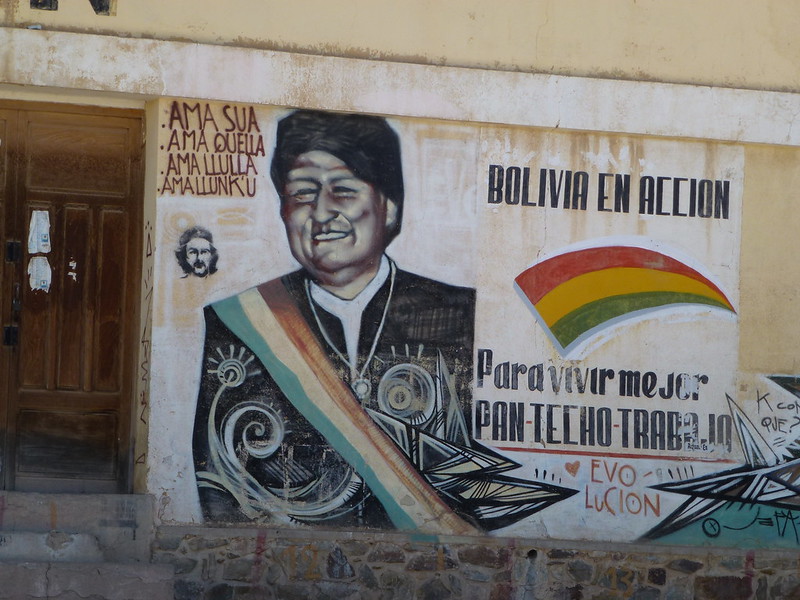Bolivia Splits Wide Open Polarization of Latin America

The left and right-wing struggle in Bolivia to hold onto power after the forced resignation of Bolivia’s longtime socialist leader Evo Morales reflects the growing divide across Latin America.
The recent forced resignation of Bolivian President Evo Morales has opened wide the ideological split currently dividing Latin American nations. While leftist governments like Mexico, Venezuela and Nicaragua have supported Morales and condemned the Bolivian coup, right-wing governments in Brazil, Peru and Colombia insist the people’s will is being played out and refuse to call Bolivia’s political crisis a coup.
Meanwhile, in Mexico, where Morales is now in exile, the socialist Morales condemned Jeanine Anez’ self-declaration as Bolivia’s new interim President describing her appointment as “the most cunning and nefarious coup in history.” Anez, herself, is described as right-wing and anti-Morales and was serving as the President of the Senate prior to Morales resignation.
What Happened in Bolivia?
On October 20, Evo Morales won his fourth term to serve as president of Bolivia but the election sparked nationwide protests after a 24-hour halt in the vote-counting process. Vote results initially showed Morales falling short of the necessary margin for victory, but when the vote-counting resumed, results showed that Morales won and avoided a December run-off by earning a 10-point lead over his opponent Carlos Mesa. However, the election was beset with accusations of voter fraud.
Bolivia enlisted the Washington, D.C.-based Organization of American States (OAS) to conduct an audit of the election. The OAS report claimed it found “physically altered tally sheets” and “forged signatures” among other voting irregularities.
“The manipulations to the computer system are of such magnitude that they must be deeply investigated by the Bolivian state to get to the bottom of and assign responsibility in this serious case,” the OAS report said.
The 60-year-old Morales then announced his resignation following weeks of bloody protests over the vote manipulation allegations and flew to Mexico where he remains in exile. Anez, who was serving as the president of Bolivia’s Senate, declared herself interim President and convened a parliamentry session to approve her appointment but the session was boycotted by members from Morales’ Movement for Socialism Party which holds a majority in Parliament.
Anez is continuing to act as interim President despite accusations that she did not obtain the necessary quorom in parliament to make her appointment legal.
But the crucial role of the OAS in Morales’ resignation has cast a shadow over the nature of Bolivia’s political crisis as many believe the organization is a tool of U.S. imperialism. The organization is so questionable that U.S. Senators Marco Rubio and Mike Lee called out the OAS in 2016 for cultural imperialism and concerns over the organization’s intentions.
OAS’ involvement and the ascension of the hardline right-wing Jeanine Anez over the socialist Morales, and Bolivia’s first indigenous leader, has prompted outcries of a Bolivian coup from across left-wing Latin America and split wide open the deep political ideological divides spread across Latin Amerca.
The Latin American Split

Pro-Bolivian president Evo Morales painting in Villazón, Bolivia in 2012. (Photo: Randall Sheppard)
Latin American socialist leaders such as Nicolas Maduro (Venezuela), Daniel Ortega (Nicaragua), Miguel Diaz-Canel (Cuba), Argentinian’s newly-elected leader Alberto Fernandez, and Andres Manuel Lopez Obrador (Mexico) have all thrown their support behind Morales. They believe the former cocoa farmer is victim of a coup.
“We have to take care of our brother Evo Morales. We must declare a vigil in solidarity to protect him,” Maduro said in a televised speech broadcast on Venezuelan’s state-owned TV station.
In Argentina, both chambers of parliament passed resolutions officially condemning the coup against Bolivian President Morales – resolutions that were ultimately supported by both Argentina’s left and right-wing blocks.
Argentina’s resolutions expressed “its repudiation of the coup d’etat perpetrated in Bolivia, which forced President Evo Morales and his vice president to resign to preserve peace.”
The Nicaraguan government also denounced the Bolivian coup in a statement and “express(ed) our rejection and repudiation of fascist practices that ignore the constitution, laws and institutionalism that govern the democratic life of nations.”
Cuba and Venezuela, too, denounced the Bolivian coup and threw their support behind Morales. But while leftist Latin American governments rose to support Maduro, Latin America’s right-wing has rallied as strongly in response.
Latin American nations’ far-right governments such as Colombia, Peru, and Brazil applauded Morales’ exit, calling for a more democratic election and acknowledging electoral fraud.
“The massive electoral fraud attempt delegitimized Evo Morales, who had the right attitude and resigned in the face of popular outcry. Brazil will support a democratic and constitutional transition,” Brazilian Foreign Minister Ernesto Araujo tweeted.
Bolivia has, in effect, become a battlefield of left versus right political ideology with Bolivia’s Latin American neighbors eager to see the victory of their own political ideology.
But as Cesar Valencia, an analyst for Santiago-based consulting firm Alpari, told Citizen Truth Latin America’s party line divides are not unusual. Latin American nations tend to support countries with the same political ideologies regardless of their problems.
“In general, this has been the historical tradition of support among the governments of Latin America, they always end up supporting countries that share the same political ideology, indifferent to the problems they may be suffering as a society,” Valencia told Citizen Truth.
Though as Jason Marczak, director of the Atlantic Council’s Latin America Center, told David A.Wemer of the Atlantic Council Bolivia has worsened Latin America’s ideological split as most countries had been able to form a consensus another recent crisis – Venezuela.
“The events in Bolivia have served to divide Latin America as to the impetus behind Morales’ departure and now whether Jeanine Áñez is the head of state. Until recently, the region was largely on the same page around the situation in Venezuela, bringing countries together across the spectrum and trying to confront the usurpation of power in Venezuela. Now we see the reverse playing out in Bolivia. Countries are debating why Evo Morales left power. Did he leave power of his own volition or was it a coup?” Marczak told Werner in an interview.
Anez herself has likely worsened the ideological divide since becoming interim president with her open-armed welcoming of the Bolivian military’s suppression of Morales supporters and with the lack of diversity in her Cabinet.
Bolivia is a country where at least 40% of the population belongs to one indigenous group or another, but when Anez announced her cabinet following Morales’ resignation she didn’t include a member from a single indigenous group. The ethnic makeup of Anez’ cabinet is especially alarming given accusations that she has made multiple anti-indegenous statements in the past.
Additionally on November 14, only two days after declaring herself president, Anez declared the Bolivian military exempt from criminal culpability in any attempt to maintain order and quell protesters. The very next day the military opened fire on indigenous pro-Morales supporters in Cochabamba, killing nine and wounding dozens more.
Foreign Influence Threatens Bolivia
While the left and right battle it out in Bolivia and across Latin America, there is also the power struggle between the U.S. and Russia for influence in the region. The U.S. has backed Anez and applauded her rise to power through a “democratic transition” while Russia has said Bolivia looks like the end result of an orchestrated coup.
“It is a matter of deep concern that during the domestic political crisis in the country, the government’s readiness to seek constructive solutions through dialogue was swept away by the development of events in the mold of an orchestrated coup,” the Russian foreign ministry said in a statement.
Russia’s statement was in stark contrast to the U.S.’ stance on Bolivia:
“The United States applauds Bolivian Senator Jeanine Anez for stepping up as Interim President of State to lead her nation through this democratic transition, under the constitution of Bolivia and in accordance with the principles of the Inter-American Democratic Charter,” US Secretary of State Mike Pompeo said in a statement.
In the end, is anyone actually acting in the best interests of the citizens of Bolivia? Another election could give Bolivians a chance to settle the political crisis for themselves, but while Anez has agreed to an election she has refused to allow Morales participation. An election depriving Bolivians of a chance to vote for Morales would just be another manipulative power play in the ideological divide plaguing Latin America.















